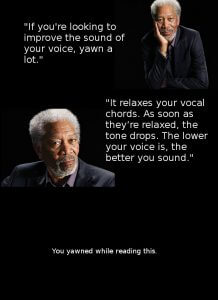Amber speaks too quickly. Her words slam and stumble into each other and she comes across as alternately nervous or excited or uncomfortable in the situation or space she is in. Rose’s voice is thin, brittle and cracks. She sounds much older than she is. From her mid-twenties, strangers on the phone have mistaken her for a senior. Derek is too loud. People are always telling him to shush or backing away a foot or two from him. Kevin sounds nasally. He is very self-conscious about it and it makes him limit his social interactions.

As a voice actor I am often asked if there is any advice I can give to help friends, family (or others) improve their voices. Some vocal problems are physical. Some are psychological. Not all vocal problems can be addressed by tips from a voice actor. But since voice is my profession and art, the answer follows:
The best way to improve your voice is to become conscious of it and take lessons. Depending on what your goals are, this may involve sessions with a speech therapist, coaching with a voice artist or singing teacher or signing up for toastmaster workshops. Bottom line: The more you become aware of your voice and the more you work with it, the better it will become.
Voice Issues May be Rooted in Childhood
Because yes, like our physical traits and talents (or lack thereof), our voices are judged by others. Occasionally vocal problems are entrenched in childhood issues. Maybe you were told to be quiet or not to say things. Perhaps in school you felt judged by an accent or speech pattern that was different than others. Cruel, excessive or inappropriate judgment can breed vocal shortcomings.
A child habitually told to keep quiet may end up believing that what they have to say is not important. They may grow up speaking too fast to try to get a word in edgewise or get out what they have to say before they are told to shut it. They may speak too softly, out of range of critics. They may be reluctant to speak at all. Someone who thinks their accent or speaking style is unacceptable, may alter their breathing adequately for clear speech. Fault finding of how you speak can lead to holding tension in your jaw, throat or shoulders.
Key to a Great Voice is to Relax

The root of many physical voice problems have to do with tightness in your jaw and/or throat. Morgan Freeman, arguably one of the smoothest richest voices in popular culture often talks about how he yawns to help open and relax his throat before any storytelling or voice acting gig.
Advice for Amber? Relax. Think about taking your time. Luxuriate in the words as you tell them. Plan pauses by focusing on breathing more fully through your conversations…Forgive me fellows, but manspread your speech, Amber. What you have to say is important. Let your words linger on the air.
Rose? Watch your posture. Shoulders back and chest lifted will give you more air in your lungs. Also a thin reedy voice means the cave of your mouth/throat is not open wide enough. Open the back of your throat by imagining a large egg or kiwi or something round that keeps that soft palate up and open. Again, like Morgan says, yawning helps you find that space.
Derek. The first way to lower your volume is to become conscious of it and then vary it. Imagine a volume control dial and play with it up and down. Focus on one word per phrase that you get to turn the volume up on. Listen more. Listen to the volume of others and emulate it.
Kevin? Unless you have a cold (or always sound like your do, so specialist required), a nasally voice usually means you sound like you’re talking through your nose which often comes from a tight throat or clenched jaw muscles. Invoking Morgan yet again, relax your throat & jaw. Imagine you have a plum (or something) in your back teeth (or back of your throat) and talk like that. It will bring that sound down into the space in which it needs to be.
Practice and Play with Your Voice

Vocal technique and faithful exercise can foster a better relationship with your own voice. It will create confidence and help overcome the pressures that can make speaking difficult. Learning to control your voice, owning it and falling in love with it is magical. You will want to talk more and people will want to listen to you. Enhancing your voice is like regaining what should always have been yours to love.
An Award winning successful voice actor for longer than millennials have roamed Earth, Kim Handysides records commercials, narrations and crazy characters daily from her professional studio and delivers them to yours.
